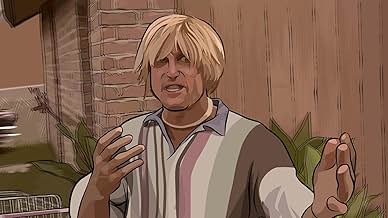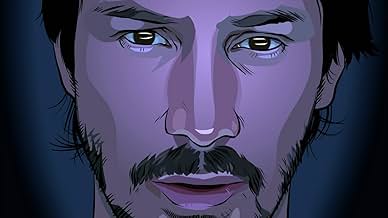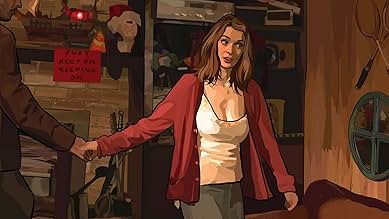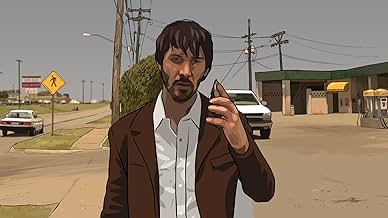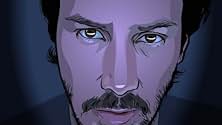CALIFICACIÓN DE IMDb
7.0/10
120 k
TU CALIFICACIÓN
En un futuro no muy lejano, un policía encubierto comienza a perder su propia identidad a consecuencia de una peligrosa nueva droga.En un futuro no muy lejano, un policía encubierto comienza a perder su propia identidad a consecuencia de una peligrosa nueva droga.En un futuro no muy lejano, un policía encubierto comienza a perder su propia identidad a consecuencia de una peligrosa nueva droga.
- Dirección
- Guionistas
- Elenco
- Premios
- 4 premios ganados y 21 nominaciones en total
Natasha Janina Valdez
- Waitress
- (as Natasha Valdez)
- Dirección
- Guionistas
- Todo el elenco y el equipo
- Producción, taquilla y más en IMDbPro
Opiniones destacadas
Let's start by saying that Scanner would be worth seeing just for the amazing visuals. The 3d graphic novel look of this movie is beautiful and original although unequal in terms of quality as if different teams worked on different parts (which is in fact the case). A very special mention has to be given to the totally incredible and unique scramble suit. The plot was quite interestingly complex yet felt disjointed at times. The dialogs which were supposed to be a highlight were sometimes suitably absurd yet not overly clever or memorable. Midway through I did feel a little bored and I had trouble caring for the druggies characters although it probably wasn't the point.
I never felt particularly emotionally involved, I felt detached (very much like the characters when you think about it). The first character you encounter (Freck) was played way too stereotypically in an exaggerated cartoony kind of way. He constantly annoyed me when he was on-screen. Fortunately, the other performances were better with the standout being the always good Robert Downey Jr. Even the usually wooden Keanu Reeves worked well in his role.
Rating: Visually, Scanner Darkly would be a 8/10, story wise it would be a 6/10 so let's average it to 7 out of 10
I never felt particularly emotionally involved, I felt detached (very much like the characters when you think about it). The first character you encounter (Freck) was played way too stereotypically in an exaggerated cartoony kind of way. He constantly annoyed me when he was on-screen. Fortunately, the other performances were better with the standout being the always good Robert Downey Jr. Even the usually wooden Keanu Reeves worked well in his role.
Rating: Visually, Scanner Darkly would be a 8/10, story wise it would be a 6/10 so let's average it to 7 out of 10
When someone on a trip starts to wig out, you take them someplace quiet and talk soothingly and assure them that everything's going to be OK. But as the tagline of this film makes clear, for these characters everything is most definitely NOT going to be OK.
For those who haven't read the book, it's important to know what you're getting into. PK Dick wrote this novel as a way of telling the story of how he and his friends in the early '70s damaged and destroyed themselves with drugs. He tells this story within the framework of a surreal science fiction thriller, but many of the scenes are straight from his own experiences with the unpleasant consequences of people using drugs and disintegrating mentally.
This film does an amazing job of capturing the feel and tone of the book as well as the paranoia, perceptual distortions, and chaos of hallucinogenic overindulgence. Add to that a story that only gradually emerges from the madness, but by the end brings in a lot of heavy ideas such as the existence of free will, whether ends justify means, etc. There is a sense of consequence to what happens in the film, a sense of despair at what has been lost. So this story of drug-addled losers becomes the story of the human struggle for identity and meaning.
I have a couple of minor quibbles regarding scenes from the book that only partially made the cut (no explanation for the significance of "If I'd known it was harmless I would have killed it myself, no little kid to explain how 6 and 3 gears means 18 speeds). Still, most adaptations of PK Dick stories take a few basic ideas and try to shape them into more conventional films that fit into established genres. Even when it works, such as with Blade Runner or Total Recall, it's not really PK Dick. Not so this film. This is PK in all his dark and perverse and deeply thoughtful glory.
For those who haven't read the book, it's important to know what you're getting into. PK Dick wrote this novel as a way of telling the story of how he and his friends in the early '70s damaged and destroyed themselves with drugs. He tells this story within the framework of a surreal science fiction thriller, but many of the scenes are straight from his own experiences with the unpleasant consequences of people using drugs and disintegrating mentally.
This film does an amazing job of capturing the feel and tone of the book as well as the paranoia, perceptual distortions, and chaos of hallucinogenic overindulgence. Add to that a story that only gradually emerges from the madness, but by the end brings in a lot of heavy ideas such as the existence of free will, whether ends justify means, etc. There is a sense of consequence to what happens in the film, a sense of despair at what has been lost. So this story of drug-addled losers becomes the story of the human struggle for identity and meaning.
I have a couple of minor quibbles regarding scenes from the book that only partially made the cut (no explanation for the significance of "If I'd known it was harmless I would have killed it myself, no little kid to explain how 6 and 3 gears means 18 speeds). Still, most adaptations of PK Dick stories take a few basic ideas and try to shape them into more conventional films that fit into established genres. Even when it works, such as with Blade Runner or Total Recall, it's not really PK Dick. Not so this film. This is PK in all his dark and perverse and deeply thoughtful glory.
In the near future a powerful new drug substance D is hooking users with every new hit. Losing the battle against the drug, the LAPD place an officer undercover as a substance D user. While the officer's identity is kept secret from his colleagues and superiors, he himself starts to lose touch with who he actually is meant to be. Becoming hooked on the drug himself and becoming friends with the people he is meant to be informing on, the officer starts to suffer a breakdown with memory and concentration loses combined with a loosening grip on reality.
I had reasonably high hopes for this film but also the fear I have when anyone takes on material that some have called "unfilmable". Written at a time when his marriage had broken down and he himself was struggling with his drug use and split identities, Dick's material does offer much of interest as long as it can be delivered in such a way to be engaging and interesting. "Making sense" was not one of the qualities I really needed, which was just as well since narratively there isn't a lot to follow along with. Parts of it are funny, parts of it are trippy and parts of it are dramatic. However none of them really come together to produce anything of that much value. It is a shame that the ideas over identity, drugs and the morals of the war on drugs are not better played out. As it is I didn't think there was enough of interest and, with the narrative being so basic, what remained was surprisingly dull.
The use of the rotoscoping was a smart move and also serves as an interesting hook for multiplex audience (and I include myself therein, so it is not a snobbish reference) that have perhaps not seen it before. Linklater produces some good effects this way and it is hard to think of another approach working as well within the context of the material as it does. Sadly this is not enough to carry the film along, although it will be enough to satisfy some sections of the audience. The cast do the best they can within this unsuccessful mix and most of them are individually good here and there. Reeves is a natural stoner but he doesn't convince with his breakdown and confusion that well; he isn't helped by the lack of focus in the script but he can't lift it regardless. Downey Jr is very funny and convincing and wards off the boredom when he is near. Harrelson tries to follow suit but with a dumber character he just falls flat. Cochrane is more enjoyable and the animation really aids his performance. Ryder is OK but she has too much of the narrative to carry and she cannot do it.
Overall this is an OK film at best. It is sporadically interesting, funny and engaging however it cannot find any consistency of tone, pace or engagement. The material is good enough to throw up interesting ideas and themes but Linklater sadly doesn't manage to do much with them across the film. The use of animation over the film cells is really well crafted and works well to support the material it is just a shame then that the awareness and control that Linklater in this area he seems to lack in others.
I had reasonably high hopes for this film but also the fear I have when anyone takes on material that some have called "unfilmable". Written at a time when his marriage had broken down and he himself was struggling with his drug use and split identities, Dick's material does offer much of interest as long as it can be delivered in such a way to be engaging and interesting. "Making sense" was not one of the qualities I really needed, which was just as well since narratively there isn't a lot to follow along with. Parts of it are funny, parts of it are trippy and parts of it are dramatic. However none of them really come together to produce anything of that much value. It is a shame that the ideas over identity, drugs and the morals of the war on drugs are not better played out. As it is I didn't think there was enough of interest and, with the narrative being so basic, what remained was surprisingly dull.
The use of the rotoscoping was a smart move and also serves as an interesting hook for multiplex audience (and I include myself therein, so it is not a snobbish reference) that have perhaps not seen it before. Linklater produces some good effects this way and it is hard to think of another approach working as well within the context of the material as it does. Sadly this is not enough to carry the film along, although it will be enough to satisfy some sections of the audience. The cast do the best they can within this unsuccessful mix and most of them are individually good here and there. Reeves is a natural stoner but he doesn't convince with his breakdown and confusion that well; he isn't helped by the lack of focus in the script but he can't lift it regardless. Downey Jr is very funny and convincing and wards off the boredom when he is near. Harrelson tries to follow suit but with a dumber character he just falls flat. Cochrane is more enjoyable and the animation really aids his performance. Ryder is OK but she has too much of the narrative to carry and she cannot do it.
Overall this is an OK film at best. It is sporadically interesting, funny and engaging however it cannot find any consistency of tone, pace or engagement. The material is good enough to throw up interesting ideas and themes but Linklater sadly doesn't manage to do much with them across the film. The use of animation over the film cells is really well crafted and works well to support the material it is just a shame then that the awareness and control that Linklater in this area he seems to lack in others.
Thanks to Rick Linklater and the Dick family for allowing a Scanner Darkly to re-envision Philip K. Dick's great novel without straying from its central themes and story line. Good film adaptations of literature are very often collaborative efforts between two or more artists - the writer and the director (and sometimes her/his production team). Make no mistake - A Scanner Darkly IS one of these collaborations - it is definitely a Linklater film - from the spare but very effective and hypnotic Graham Reynolds sound track to the disturbing but mesmerizing holosuit scenes and the pseudo-philosophical paranoiac banter between Harrelson and Downey's characters. In fact, I remember the last time I read Dick's novel - around the time I heard Linklater was directing this film - thinking that some of the scenes in the book could be lost in Linklater's wonderful film "Slacker".
Linklater and Dick are a perfect match.
The story is about a deep-cover narcotics officer (Reeves) who is in danger of becoming one of his own targets, since he has become addicted to a very popular and addictive hallucinogen - Substance D (AKA "Death") The cast is all very good, and extremely well suited for their characters. But here again, we are seeing Linklater's interpretation of the novel. He saw the comedic potential for the Barris character and played it up by giving the role to Downey and presenting Harrelson as a combination of loyal side-kick and straight-man to Downey's sometimes overpowering Barris.
What the story is really about is the culture of recreational drug use and addiction. Its portrayal of this is on target, and though the subject is treated with some sympathy, the contradictory messages, denials, and complex rationalizations permeating that culture also come through powerfully. In this manner, the film nails the book spot-on.
Reeves is perfectly cast as Arctur. His subtle and somewhat detached style is exactly what was needed for this complex and sympathetic character. And although some have stated that he was "blown off the screen by Downey and Harrelson" I couldn't agree less. Downey is louder and more domineering, yes, but Arctur is not a loud, ultra-dynamic, paranoid, and could not be played in a way which could compete with Downey's character.
Although I believe Winona Rider to be very talented, I had my doubts about her in the role of Donna - one of my favorite characters in Dick's novel. However, once again, Winona exceeded my expectations. I have never seen a bad performance out of her.
This is great casting, period.
While these are not criticisms, I feel obligated to make a couple of comments comparing the book and the film. First, the film is not really as dark and disturbing as the book. I can not explain why in this review - you will have to see it to understand why I say this. Second, I was very slightly disappointed by the reduced role of Donna in this film. Third - though some have commented that the film was hard to follow and that they felt they could only really get it if they read the book - I can only say that this is probably intentional. Yes, many of Linklater's films are non-linear and can be hard to follow for those who expect to have things explained to them. Linklater is, if nothing else, an artist and doesn't seem very interested in linearity or explanation. And the original work by Dick is no less ambiguous. In fact it is, in my opinion, more ambiguous.
This film does a great job of bringing to the screen one of the most intelligent and emotional works of science fiction ever written. My thanks to all involved.
Linklater and Dick are a perfect match.
The story is about a deep-cover narcotics officer (Reeves) who is in danger of becoming one of his own targets, since he has become addicted to a very popular and addictive hallucinogen - Substance D (AKA "Death") The cast is all very good, and extremely well suited for their characters. But here again, we are seeing Linklater's interpretation of the novel. He saw the comedic potential for the Barris character and played it up by giving the role to Downey and presenting Harrelson as a combination of loyal side-kick and straight-man to Downey's sometimes overpowering Barris.
What the story is really about is the culture of recreational drug use and addiction. Its portrayal of this is on target, and though the subject is treated with some sympathy, the contradictory messages, denials, and complex rationalizations permeating that culture also come through powerfully. In this manner, the film nails the book spot-on.
Reeves is perfectly cast as Arctur. His subtle and somewhat detached style is exactly what was needed for this complex and sympathetic character. And although some have stated that he was "blown off the screen by Downey and Harrelson" I couldn't agree less. Downey is louder and more domineering, yes, but Arctur is not a loud, ultra-dynamic, paranoid, and could not be played in a way which could compete with Downey's character.
Although I believe Winona Rider to be very talented, I had my doubts about her in the role of Donna - one of my favorite characters in Dick's novel. However, once again, Winona exceeded my expectations. I have never seen a bad performance out of her.
This is great casting, period.
While these are not criticisms, I feel obligated to make a couple of comments comparing the book and the film. First, the film is not really as dark and disturbing as the book. I can not explain why in this review - you will have to see it to understand why I say this. Second, I was very slightly disappointed by the reduced role of Donna in this film. Third - though some have commented that the film was hard to follow and that they felt they could only really get it if they read the book - I can only say that this is probably intentional. Yes, many of Linklater's films are non-linear and can be hard to follow for those who expect to have things explained to them. Linklater is, if nothing else, an artist and doesn't seem very interested in linearity or explanation. And the original work by Dick is no less ambiguous. In fact it is, in my opinion, more ambiguous.
This film does a great job of bringing to the screen one of the most intelligent and emotional works of science fiction ever written. My thanks to all involved.
Like most works by the late Phillip K. Dick, "A Scanner Darkly" provides stinging social commentary embedded in a deeply disturbing vision of a dystopian future. Based on some of his own experiences with drug addiction and rehabilitation, Dick's 1977 novel tells the complex tale of a man who, through an illicit drug he is taking, becomes a split personality, with one half of him being an addict and the other half being a narc - but with neither half aware of the other half's existence. If that sounds like a bit of a "head trip," that is clearly Dick's intent here, for what better way to capture the dreamlike and hallucinatory nature of psychedelic, mind-altering drugs? And what better way for a filmmaker to reproduce that effect on film than through the technique known as "rotoscoping," in which live actors are filmed doing their scenes, then later drawn over and turned into seamlessly flowing animation? This is the style made famous in the 1980's with the A-Ha video "Take on Me" and Linklater's own full length feature in the '90's, "Waking Life." In the case of "A Scanner Darkly," especially, its use results in a perfect marriage of form and content.
In this prescient tale set in the "near future," Keanu Reeves plays the undercover cop, Agent Fred, who, under the pseudonym Bob Arctor, is sent to live in a home with several known drug addicts: Barris, played by Robert Downey Jr. and Luckman, played by Woody Harrelson. When Fred begins taking the newly fabricated drug known as "Substance D," which causes the two hemispheres of the brain to disconnect and go to war with one another, Fred/Arctor becomes essentially two distinctly separate persons, so that, in his capacity as an undercover agent, he is actually spying on himself without realizing it. Winona Ryder appears as Donna, the beautiful but sexually frigid coke addict who becomes Arctor's girlfriend.
"A Scanner Darkly" is an easy film for a viewer to get lost in, so it pays to know a little something about the story before heading into it. As a screenwriter, Linklater captures the woozy insubstantiality of the drug experience well enough but often at the expense of narrative consistency and coherence, especially for the uninitiated. I'm afraid lots of people may become frustrated and confused near the beginning and simply tune out. That would be a real shame because the movie turns into a darkly fascinating rumination on the effect drug use has on the mind, while at the same time raising the ethical issue of just how far the government should go in "sacrificing" innocent victims to achieve a desired, perhaps even laudable, end. At times the movie may seem to be playing both sides of the drug-war fence, yet the sophistication and complexity of Dick's vision keeps it from becoming either an anti-government screed or an anti-drug diatribe.
Some of the dialogue comes off as corny and over earnest, but much of it is incisive and darkly humorous, with Barris and Larkman, in particular, hitting delicious comic heights in their paranoid/delusional ravings and interchanges.
In this prescient tale set in the "near future," Keanu Reeves plays the undercover cop, Agent Fred, who, under the pseudonym Bob Arctor, is sent to live in a home with several known drug addicts: Barris, played by Robert Downey Jr. and Luckman, played by Woody Harrelson. When Fred begins taking the newly fabricated drug known as "Substance D," which causes the two hemispheres of the brain to disconnect and go to war with one another, Fred/Arctor becomes essentially two distinctly separate persons, so that, in his capacity as an undercover agent, he is actually spying on himself without realizing it. Winona Ryder appears as Donna, the beautiful but sexually frigid coke addict who becomes Arctor's girlfriend.
"A Scanner Darkly" is an easy film for a viewer to get lost in, so it pays to know a little something about the story before heading into it. As a screenwriter, Linklater captures the woozy insubstantiality of the drug experience well enough but often at the expense of narrative consistency and coherence, especially for the uninitiated. I'm afraid lots of people may become frustrated and confused near the beginning and simply tune out. That would be a real shame because the movie turns into a darkly fascinating rumination on the effect drug use has on the mind, while at the same time raising the ethical issue of just how far the government should go in "sacrificing" innocent victims to achieve a desired, perhaps even laudable, end. At times the movie may seem to be playing both sides of the drug-war fence, yet the sophistication and complexity of Dick's vision keeps it from becoming either an anti-government screed or an anti-drug diatribe.
Some of the dialogue comes off as corny and over earnest, but much of it is incisive and darkly humorous, with Barris and Larkman, in particular, hitting delicious comic heights in their paranoid/delusional ravings and interchanges.
¿Sabías que…?
- TriviaRobert Downey, Jr. wrote most of his lines down on post-it notes and scattered them around the set so he could read off them while filming a scene. The rotoscoping team simply animated over the notes to remove them from the film during post-production.
- ErroresWhile showing the monitoring equipment, Hank tells Fred that he could be anyone from Arctor's circle of friends, including Barris. This made sense in the book, however, by this time in the movie Hank has already seen Fred alongside Barris, so he could not possibly think they are the same person.
- Citas
Fred: [voiceover] What does a scanner see? Into the head? Down into the heart? Does it see into me? Into us? Clearly or darkly? I hope it sees clearly because I can't any longer see into myself. I see only murk. I hope for everyone's sake the scanners do better, because if the scanner sees only darkly the way I do, then I'm cursed and cursed again.
- Créditos curiososThe "Phil" mentioned in the "in memoriam" list as having permanent pancreatic damage is Philip K. Dick himself.
- Bandas sonorasFog
Written by Thom Yorke (as Thomas Yorke), Phil Selway (as Philip Selway), Jonny Greenwood (as Jonathan Greenwood),
Colin Greenwood and Ed O'Brien (as Edward O'Brien)
Performed by Radiohead
Courtesy of Capitol Records
Under licence from EMI Film & Television Music
Selecciones populares
Inicia sesión para calificar y agrega a la lista de videos para obtener recomendaciones personalizadas
Detalles
- Fecha de lanzamiento
- País de origen
- Sitio oficial
- Idioma
- También se conoce como
- A Scanner Darkly
- Locaciones de filmación
- Productoras
- Ver más créditos de la compañía en IMDbPro
Taquilla
- Presupuesto
- USD 8,700,000 (estimado)
- Total en EE. UU. y Canadá
- USD 5,501,616
- Fin de semana de estreno en EE. UU. y Canadá
- USD 391,672
- 9 jul 2006
- Total a nivel mundial
- USD 7,660,857
- Tiempo de ejecución
- 1h 40min(100 min)
- Color
- Mezcla de sonido
- Relación de aspecto
- 1.85 : 1
Contribuir a esta página
Sugiere una edición o agrega el contenido que falta



